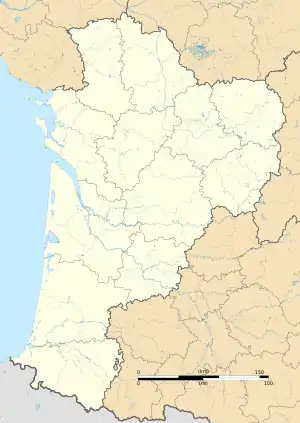Brie, Deux-Sèvres
Brie (French pronunciation: [bʁi] ⓘ) is a former commune in the Deux-Sèvres department in the Nouvelle-Aquitaine region in western France. On 1 January 2019, it was merged into the new commune Plaine-et-Vallées.[2]
Brie | |
|---|---|
Part of Plaine-et-Vallées | |
 The church in Brie | |
Location of Brie | |
 Brie  Brie | |
| Coordinates: 46°55′14″N 0°02′23″W | |
| Country | France |
| Region | Nouvelle-Aquitaine |
| Department | Deux-Sèvres |
| Arrondissement | Bressuire |
| Canton | Le Val de Thouet |
| Commune | Plaine-et-Vallées |
| Area 1 | 11.96 km2 (4.62 sq mi) |
| Population (2019)[1] | 163 |
| • Density | 14/km2 (35/sq mi) |
| Time zone | UTC+01:00 (CET) |
| • Summer (DST) | UTC+02:00 (CEST) |
| Postal code | 79100 |
| Elevation | 50–71 m (164–233 ft) (avg. 88 m or 289 ft) |
| 1 French Land Register data, which excludes lakes, ponds, glaciers > 1 km2 (0.386 sq mi or 247 acres) and river estuaries. | |
Geography
The commune of Brie, located north of the department of Deux-Sèvres, is limited to the east by the department of Vienne. Located 15 km (9 mi) east-southeast of Thouars, it is watered by the Vieille Dive, a secondary arm of the river Dive.
The municipality of Brie is part of the community of communes of Thouarsais and the union of Pays Thouarsais.
History
On the map of Cassini de Thury showing France between 1756 and 1789, the village is identified as Brye.
By prefectural order of December 4, 1972, effective January 1, 1973, the municipalities of Bilazais, Brie and Noizé merged with Oiron. On 14 February 1983, Brie became independent again (prefectural decree of 11 February 1983).
Policy and administration
List of successive mayors
- Until January 2002 the mayor was Yvon Réau.
- From February 2002 and re-elected in 2008 the mayor was Norbert Bonneau PS.[3]
Places and monuments
- The church whose stained-glass windows were redone in modern form, which brings a very particular luminosity inside the nave
- The old chapel of Sazais.
 L'église
L'église Nef de l'église
Nef de l'église L'ancienne chapelle de Sazais
L'ancienne chapelle de Sazais
Demography
| Year | Pop. | ±% p.a. |
|---|---|---|
| 1962 | 334 | — |
| 1968 | 273 | −3.31% |
| 1975 | 253 | −1.08% |
| 1982 | 230 | −1.35% |
| 1990 | 228 | −0.11% |
| 1999 | 208 | −1.01% |
| 2008 | 193 | −0.83% |
| 2017 | 171 | −1.34% |
References
- Téléchargement du fichier d'ensemble des populations légales en 2019, INSEE
- Arrêté préfectoral 7 November 2018 (in French)
- "Élus Deux-Sèvres" (PDF). May 2011. Archived from the original (PDF) on 2011-07-08.